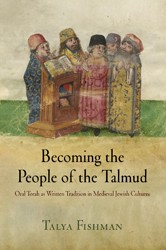Rabbi Menahem ha-Meiri is, today, one of the better-known Talmudists of the Middle Ages. He lived in Perpignan, in what is now the south of France, and died around the year 1315. His Talmudic commentary is known for its crisp Hebrew, its encyclopedic range, and its amazingly liberal attitude toward Gentiles. The Meiri claimed that all the disparaging statements and discriminatory laws referred only to the ancient Pagans, and that the Christians among whom he lived belonged to a hitherto unknown category of religiously moral people.
Gregg Stern places the Meiri in his historical context, finding thinkers both Jewish and Christian whose views mirrored or anticipated those of the Meiri. He illuminates the philosophical assumptions that provide the foundations for the rabbi’s innovations. He also provides a detailed account of the “Maimonidean Controversy” which riled the Jewish communities of France and Catalonia at the beginning of the 14th century. Meiri played only a minor role in this controversy, but it does provide a vivid backdrop to understanding the intellectual world in which Rabbi Menahem lived. This book is written in clear language and benefits from an up-to-date bibliography, but both the subject matter and the structure of the book make it a dense read. Bibliography, index, maps.





